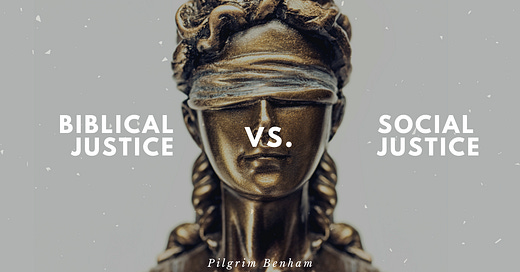One of the cultural buzzwords today is “justice” - and many Christians find themselves concerned (if not confounded) by the evil in our day and what our response is to be as citizens of God’s righteous and just kingdom. The truth is, justice is not a trending word only in the current day and age. It is a term found throughout Scripture. We are told in Micah 6:8 three things that “the Lord requires”: to do justice, to love kindness, and to walk humbly with our God. What does it mean to “do justice”?
In the Old Testament, there are two words that often appear together: righteousness (tsedekah) and justice (mishpat). Both of these emanate from God, and describe a society experiencing true shalom, or wholeness. These words together describe someone who stands before God and before man, walking in proper relationship with both of them - in obedience to God's law (righteousness) and in care and concern for our fellow image bearers (justice). In Amos 5:24, God describes these two as the banks of a mighty river. Listen to how they are described in Ezekiel 18:5-9:
“If a man is righteous and does what is just and right— 6 if he does not eat upon the mountains or lift up his eyes to the idols of the house of Israel, does not defile his neighbor’s wife or approach a woman in her time of menstrual impurity, 7 does not oppress anyone, but restores to the debtor his pledge, commits no robbery, gives his bread to the hungry and covers the naked with a garment, 8 does not lend at interest or take any profit, withholds his hand from injustice, executes true justice between man and man, 9 walks in my statutes, and keeps my rules by acting faithfully—he is righteous; he shall surely live, declares the Lord God.”
Biblical righteousness and justice are more than retributive or just getting what one deserves - it is ultimately about the restoring of right relationship. Upholding God's ways means standing before God rightly, as well as looking out for those the world would deem worthless and standing before them rightly as well.
The term “social justice” is often overused and misunderstood in the church today. There is a significant difference between biblical justice and social justice (these are not exhaustive!):
The foundation of social justice is fairness; the foundation of Biblical justice is God.
The starting point (or foundation) to answer injustice should be the nature and character of God, not seeking to apply “fairness”. As fallen, rebellious sinners in Adam, if we truly received what was ‘fair’, we would be destroyed before our first breath.
Social justice deals with the symptoms; Biblical justice deals with the heart.
Racism, sexism, corruption, and the like are all rooted in the depraved, wicked heart of man. Social justice would gladly treat infrastructures or “systems” that breed injustice, without ever remedying the root cause of it all: sin. Jeremiah 17:9 states, “The heart is deceitful above all things, and desperately sick; who can understand it?”
Social justice demands man answer to man; Biblical justice demands man answer to God.
By what standard do we exact vengeance or correction? Many who read the biblical accounts of Israel destroying entire nations would balk at the notion that this was God’s good counsel. They would demand that God answer to them for his unfairness in wiping out an entire civilization, without taking into account that all God does is good (Psalm 145:17) and does not need to answer to man for his ways (Isaiah 55:8-9; 1 Corinthians 1:25).
Social justice creates categories of identity; Biblical justice roots our identity in Christ.
We are not “white” or “black” Christians, but simply Christians! All believers are united by and through the shed blood of our Lord, and are being conformed into his perfect, glorious image. Though secondary markers of identity can be helpful and useful, they are still secondary. What is primary is that we are no longer in Adam, we are in Christ!
Social justice looks for equal results; Biblical justice calls for equal opportunity.
This can be seen in the words “equity” vs. “equality”. Equality means each individual or group of people is given the same resources or opportunities, which is truly just and right. God commands Israel in Isaiah 1:17 to: “learn to do good; seek justice, correct oppression; bring justice to the fatherless, plead the widow’s cause.” The fatherless, the widow, and the foreigner do not have the same resources as the blood-born child of Abraham - therefore Israel is to come to the defense of the helpless. Equality says everyone should get a fair shot. However, equity means that everyone should receive the same outcome. It doesn’t matter if this or that person is best-fitted for the job - what matters is that five widows are hired to ensure the quota is met. Equity ironically becomes the very definition of injustice!
God has called us to be a righteous and just people, not to virtue signal and “look attractive” to the world in this climate of unrest and injustice, but because this reflects his very nature. One day, he will right every wrong, wipe away every tear, and have the final word as the former things, including man’s wicked and partial ways, are brought to an end (Revelation 21:4). Until then, may we uphold righteousness and justice, which are “the foundation of your throne” (Psalm 89:14)!




